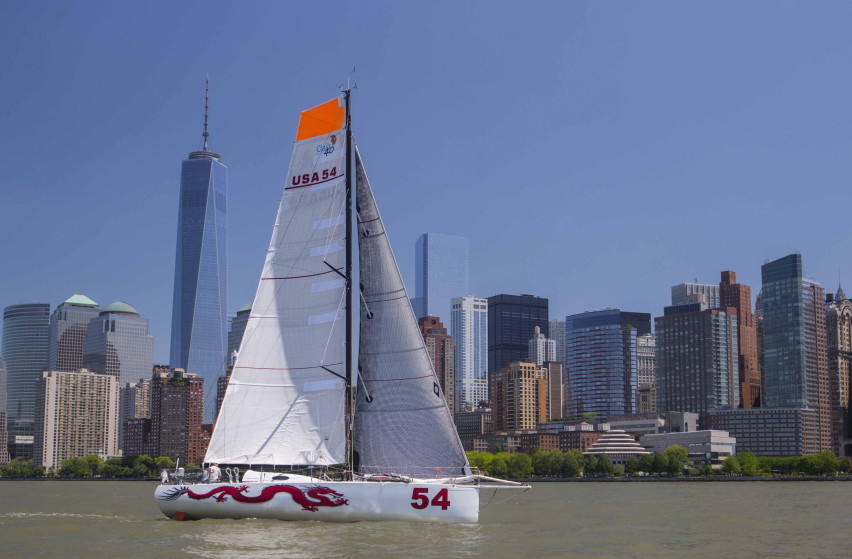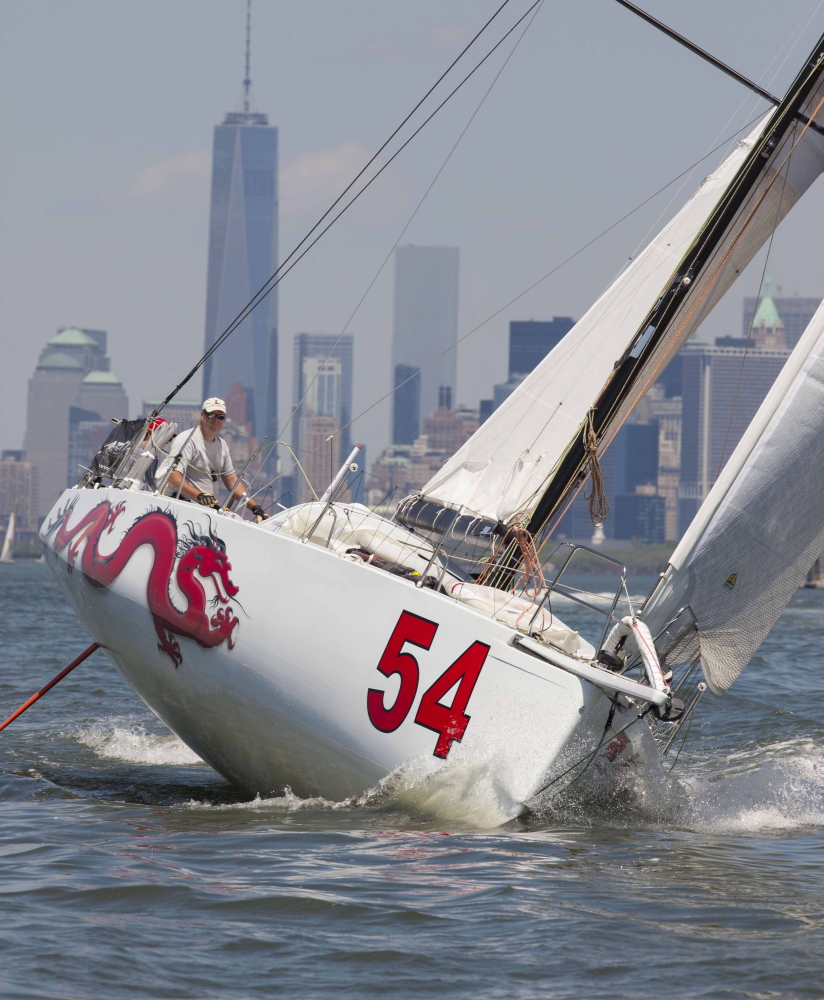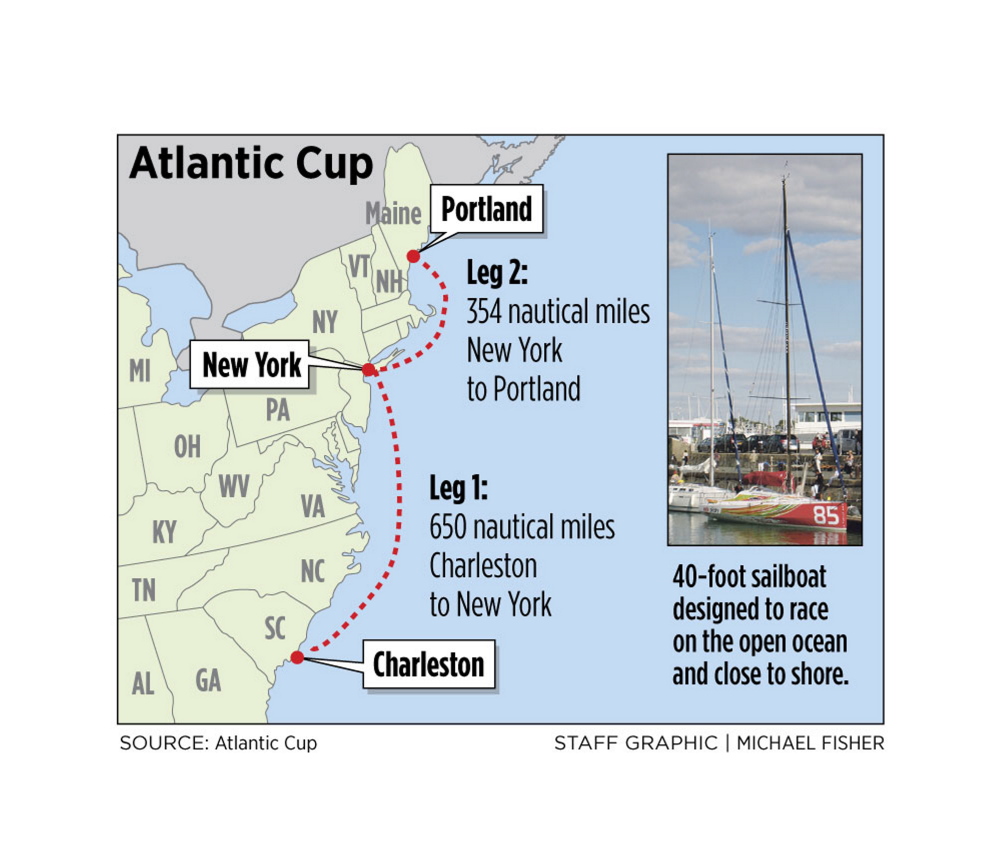The Atlantic Cup sailing race is coming to Portland in 2016 and its final leg will coincide with the Old Port Festival, race officials and festival organizers said Friday.
The race pitting Class 40 boats with two-person crews has been held since 2011 and traditionally has started in Charleston, South Carolina, made a stop in New York City and ended in Newport, Rhode Island. Organizers sought to extend next year’s race to northern New England and add a third leg consisting of two days of inshore racing on Casco Bay.
The 2016 race will start on May 28 with a 648-nautical mile offshore leg from Charleston to New York City.
The record for the Charleston-to-New York City run is about 78 hours, according to Julianna Barbieri, co-founder of Manuka Sports Event Management, which stages the race.
The racing continues on June 4, when the 40-foot boats depart on the 350-nautical mile leg to Portland, most likely arriving in the Old Port on June 6.
Each boat then will add four crew members, giving them a total of six, for inshore racing on courses marked by buoys in Casco Bay on June 10 and 11.
“It’s really a great way to test all the strengths of the sailors,” Barbieri said, with the longer leg from South Carolina to New York, the slightly shorter offshore race to Portland and then the inshore racing.
The Class 40 boats are high-performance monohulls designed for short-handed offshore sailing. Competitors are free to manipulate the designs of their boats as long as they don’t exceed a maximum length of 40 feet.
Awards will be presented during the Old Port Festival, with a $20,000 prize pool, Barbieri said.
Steve Hewins, executive director of Portland’s Downtown District and an organizer of the Old Port Festival, said Barbieri’s company approached his organization last year to gauge interest in culminating their event in the city.
When Hewins told them their race schedule would coincide with an already popular event that draws tens of thousands of people downtown, race officials were hooked, he said.
“It will all be part of the expanded Old Port Festival,” Hewins said.
Festival organizers announced an expanded lineup this year, extending the music and arts gathering to four days, June 11-14, and adding three evening concerts by national acts on the Maine State Pier: Kenny Wayne Shepherd and Jonny Lang on June 11, The Wailers and Rusted Root on June 12, and David Gray and Rachael Yamagata on June 13. The Maine State Pier events are ticketed events, with an additional two dozen free street concerts that will take place in the city throughout the weekend.
Portland Mayor Michael Brennan said the race will reinforce the city’s maritime heritage and should attract more people to the waterfront.
Barbieri said five sailing teams have confirmed entry into the race, and depending on the schedule of European sailors, as many as five more could join. The boats pay $1,500 to enter, she said.
Organizers were looking for a longer leg for the second half of the race, she said. Even with a “turning mark” off New Jersey, designed to lengthen the course, it was only about 240 nautical miles from New York to Newport. The New York-to-Portland leg will be 350 nautical miles, Barbieri said.
“It’s definitely more challenging,” she said.
After the boats arrive in port, Barbieri said, there will be opportunities for the public to learn about the equipment, meet the crews and tour the boats. She said organizers have not yet decided where the boats will tie up, but it will be somewhere along the Portland waterfront.
Bill Needelman, waterfront coordinator for the City of Portland, said this is the first ocean racing event to come to the city in recent memory.
“We look forward to creating an exciting venue for them that is compatible with our parks and our neighborhoods,” Needelman said. “I think it’s a good opportunity to see if this is the type of event we want to see more of.”
Barbieri said it’s difficult to estimate the economic impact of the race on Portland, but she said crews and some support staff will stay in local hotels, eat in local restaurants and may make repairs or get new equipment at local boatyards. And some boats may stick around for a while, she added, because the next race is in July, when they will race from Quebec to France.
Send questions/comments to the editors.







Success. Please wait for the page to reload. If the page does not reload within 5 seconds, please refresh the page.
Enter your email and password to access comments.
Hi, to comment on stories you must . This profile is in addition to your subscription and website login.
Already have a commenting profile? .
Invalid username/password.
Please check your email to confirm and complete your registration.
Only subscribers are eligible to post comments. Please subscribe or login first for digital access. Here’s why.
Use the form below to reset your password. When you've submitted your account email, we will send an email with a reset code.